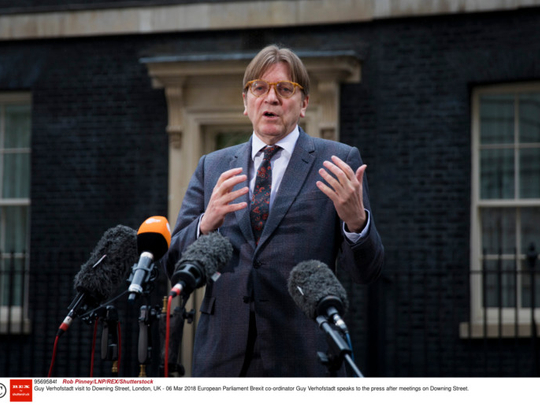
The post-war liberal world order risks being torn up before our very eyes: Confronted by the United States President Donald Trump, a Russia which is successfully injecting chaos into the West and a China seemingly happy to sit back and await its turn at the top of the table. No doubt people of Europe have some fundamental decisions to make.
Do we want to inhabit a continent founded on a respect for liberal democracy, the rule of law and a humane approach to migration? Or do we cede to the populists promoting fear over hope and division over unity? Brexit aside, the people of Britain will face these great challenges and their consequences, too.
Take migration, the primary issue in Europe now. Europeans may reel in horror at the consequences of Trump’s immigration policy, epitomised by children fleeing violence in Guatemala being separated from their parents. We are right to be horrified, because it is a disgrace. But are Europeans handling the challenge of migration any more effectively?
As reported week before last, 34,361 migrants have drowned in the Mediterranean Sea, trying to reach Europe, since 1993. Europe’s asylum policies, which put the burden almost entirely on the countries receiving most migrants, have failed, while populists, such as the new far-right Italian Interior Minister Matteo Salvini, have successfully raised fears and misconceptions about the number of people arriving and their effects on European societies. The result is that a much-needed collective response; a humane, coherent, European asylum and migration system, seems increasingly out of reach.
One suggestion is “regional disembarkation platforms” in North Africa, under the auspices of the United Nations High Commissioner for Refugees (UNHCR) and the International Organisation for Migration. These platforms could allow rapid processing to distinguish between economic migrants and those in need of international protection, while reducing the incentive to embark on perilous journeys in the hands of people-traffickers.
These proposals have already been met with scepticism, but if combined with a revision of the Dublin regime and a system of “burden-sharing” between EU countries, they could go some way to ensuring asylum-seekers can apply directly to EU countries for asylum, rather than paying traffickers to risk their lives at sea, which surely must be one of our objectives.
What is clear is that individual EU countries can’t deal with this matter on their own. Nationalists offer no credible solutions and will fail. We must find a common approach before thousands more lives are lost. Where Trump has disgraced himself, Europe must show that a fair, humanitarian approach is possible.
An adjoining but equally totemic challenge facing the people of Europe is the growing split between liberal democratic leaders and the authoritarians of central and eastern Europe. Dutch Prime Minister Mark Rutte, French President Emmanuel Macron and others have spoken of the need to tackle this crisis for the rule of law head-on. Regrettably, other traditional defenders of liberal democracy, including the United Kingdom, have kept silent.
In Hungary, backsliding on the rule of law has reached a tipping point. Prime Minister Viktor Orban’s new “stop Soros” legislation, which makes it a criminal offence to assist migrants, coupled with a labelling of organisations working on migration issues reminiscent of the Nazi era, threatens to take Hungary and Europe back to the 1930s. In Poland, the PiS government’s assault on their own country’s judiciary is grave. We must rely on the supranational institutions we have built to check these abuses of power, but there is no guarantee of success. Orban, who has been busy building an illiberal alliance, with the assistance of former White House chief strategist Steve Bannon is intent on infecting Europe’s mainstream conservatism from within.
Next year’s European parliament elections could be a turning point; the divide between those who believe in an open Europe and a closed Europe will be starker than ever. Putin’s plan — a showdown between those defending a liberal democratic Europe and a populist Europe — risks becoming a reality. The people of Britain, in all likelihood outside the bloc from next March, will not be immune to this rupture.
Determined to keep the likes of Hungary and Poland sweet in an attempt to split Europe for the purposes of Brexit, the British government shares the blame in the decline of the democratic institutions it helped build in central and eastern Europe after the fall of Communism.
The geopolitical consequences of Brexit didn’t loom large in the British referendum debate, but they can no longer be ignored. Trump may continue to turn away from the liberal world order that has kept peace in Europe since the Second World War.
The tensions flaring over migration are an immense test for European cooperation, but we all have a duty to fight for a continent we are proud of. Brexit is just the opening salvo in an existential battle to come.
— Guardian News & Media Ltd
Guy Verhofstadt is also the European parliament’s Chief Brexit Representative.










